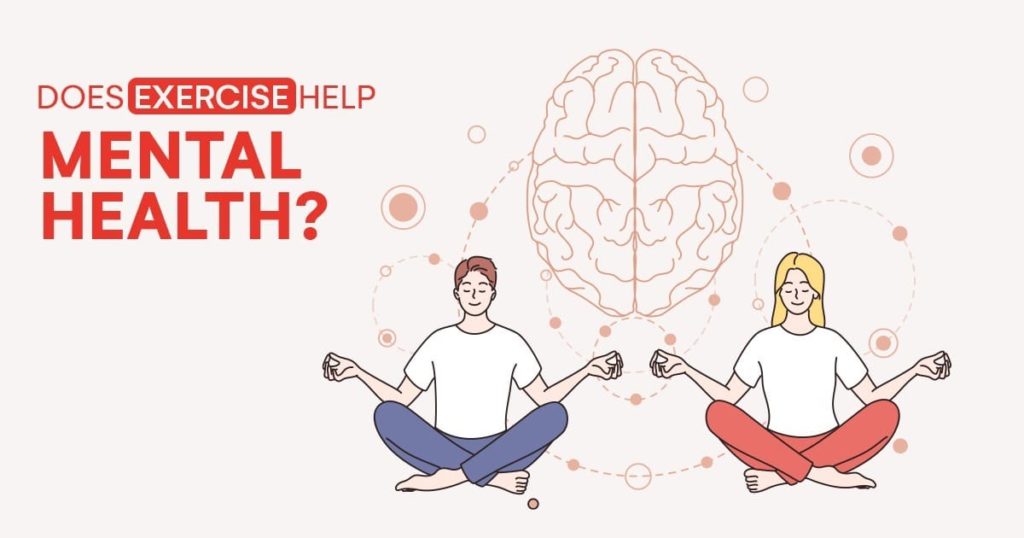There are certain things you can do to help yourself if you struggle with your mental health; one such thing is lifestyle changes like exercising regularly.
Does exercise prevent mental illness or cure it?
Not necessarily.
Does exercise help mental health?
Absolutely.
If you work with a therapist or counselor, in addition to a treatment plan with talk therapy or medication, the mental health professional might recommend you make lifestyle changes.
Below, we talk more about how exercise sessions can help fix mental & physical health problems and what you should know.
What Are the General Benefits?
Before specifically answering “does exercise help mental health,” it’s good to know the general benefits it can have in your life.
Overall benefits of exercising regularly include:
- You can control your weight more effectively and prevent or reverse obesity. Obesity contributes to health complications and poor outcomes, including a higher risk of cancer, heart disease, and type 2 diabetes.
- You can strengthen your heart. Heart disease is a top killer. During physical activity, your blood flow increases. Increased blood flow reduces your blood pressure and risk of coronary artery disease and heart attack.
- Your body’s insulin works more effectively and can lower your blood sugar. Lowering your blood sugar can help reduce your risk of metabolic syndrome in addition to type 2 diabetes.
- Physical activity keeps your brain active and sharp; your body releases proteins and chemicals that help your brain’s function and structure.
- Regular activity is good to build strong bones. As you age, operation can slow bone density loss and help you maintain your strength and muscle mass.
- Moving your body can lower the risk of developing many types of cancer, including breast, uterine, lung, and colon.
- As you age, if you stay physically active, movement can help reduce the potential of falls.
- Research shows activity can help improve your lifespan and boost your longevity.

Mental Health Center of San Diego
Does Exercise Help Mental Health?
Along with the benefits above, does exercise help mental health? Absolutely. Benefits for mental health include:
Depression
Studies show us that exercise programs can treat mild to moderate depression and an antidepressant medicine without side effects. For example, a study from the Harvard T.H.
Chan School of Public Health showed that running for just 15 minutes a day or walking for an hour led to a 26% lower risk of major depression.
Along with helping with depression symptoms, having a schedule may help prevent a relapse into depression.
Physiological changes indicate how it can help reduce symptoms of depression and relapse risk.
For example, exercising increases neural growth and reduces inflammation, and helps promote calm and well-being.
Keeping active can help distract you from negative thoughts or feelings in your life so you can break the cycle of specific thought patterns and it releases brain chemicals that lift our mood called Endorphins.
Anxiety
When we work out, it improves mental health and can reduce anxiety in multiple ways.
- Relieves our stress and tension, boosts our energy level, and again, increases endorphins that help us feel good
- An excellent time to practice mindfulness, which is helpful for people with anxiety
- You can think about how your body feels as you walk or run. You can focus on those small things that you might not otherwise consider
- A powerful way to relieve physical symptoms of tension and stress
Mental Health Center of San Diego
PTSD and Trauma
Meta-analysis research shows that the positive effects of exercise can extend for people with mental health conditions like PTSD and trauma. Regular physical activity can help your nervous system move out of the period of being “frozen,” which tends to happen with trauma exposure. Outdoor exercise, in particular, is good to reduce PTSD symptoms.
Other Benefits
- The endorphins that your body releases as you are physically active can help you have better thinking and memory. Training can stimulate new brain cells and reduce declines that happen as we age.
- When you’re active, it can improve your self-esteem. Exercising may help you feel stronger, and it can give your self-worth a boost. You are achieving something, and that’s great for mental health.
- Exercising promotes sleep; movement can regulate sleep patterns; mental health disorders have symptoms that relate to sleep.
- Low energy levels are a symptom of depression, but exercising can help you feel more energetic.
- You are more resilient when you train because you are healthily challenging yourself.
How to Get Started
If you are dealing with a mental health disorder’s symptoms, you may feel like it’s overwhelming to start working out. Luckily, you can start as small as you need to. Physical exercise doesn’t have to be all-or-nothing.
The following are tips that can help you find the motivation to begin including movement in your daily routine:
- Break up your sessions into short, compact chunks of physical activity if that’s best for you. For example, 30 minutes of moderate exercise five times a week is shown to have physical and mental benefits. You can do three 10-minute sessions a day or two 15-minute sessions and get the same benefits.
- Something is always better than nothing. Start with just five minutes if that’s all you can do, and then set goals for yourself to continue increasing the length and intensity of your exercise.
- Experiment and find a type of activity that you enjoy. For example, maybe you prefer to do yoga, dance or swimming. When you find something that you genuinely enjoy, it will help motivate you to keep up with a consistent routine.
- If you feel incredibly exhausted, which is a common barrier, then promise yourself just five minutes of movement. If you do that and you still feel tired, that’s okay, but what you might find is that a short period gives you more energy, and you can keep going.
- Try to plan for when you know your energy levels are at their highest.
- If you prefer to, make working out something that’s social. You might take a walk with a friend or participate in a group class, for example. Social exercise can give you even more benefits if you have depression or anxiety because companionship is also suitable for dealing with symptoms.
Mental Health Center of San Diego
Final Thoughts
When you exercise, you are helping your brain in significant and tangible ways, for instance, you will increase levels of dopamine, norepinephrine, and serotonin in the brain and normalize your neurotransmitter levels to help boost your mood and energy levels.
Again, does exercise prevent mental illness?
Maybe not entirely, but it can be such an essential part of your treatment and overall recovery as well as relapse prevention.
Call (858) 258-9883 to talk to a health care provider at the Mental Health Center of San Diego and get advice on how you can safely and effectively include exercise in your daily life, or to discuss a treatment track that includes medication or therapy as well. Help is just a call away.









